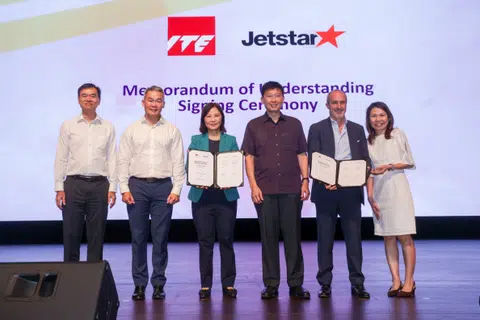New ITE course allows cabin crew to earn diploma while flying around the world
Ms Nur Nadhrah Musa has set her sights on a career in the aviation industry, following in her parents' footsteps.
Not only is the 21-year-old Institute of Technical Education (ITE) student about to complete the Higher Nitec course in passenger services, but she is also currently interning as a cabin crew member at low-cost carrier Jetstar Asia.
And, to upskill herself as she embarks on her career, Ms Nadhrah has applied for a place in ITE's new Work-Study Diploma (WSDip) in Customer Experience Management (Cabin Services) programme.
The 2½-year course was launched on Feb 14 at ITE's first aviation symposium.
It is the first WSDip programme aimed at equipping those interested in becoming cabin crew members.
There were more than 100 applications for the 23 places on offer.
Students will learn in-flight customer service and how to manage cabin emergency situations, among other skills.
Trainees in ITE work-study programmes spend up to 80 per cent of their time learning on the job, and the remainder in classroom-based lessons.
Ms Nadhrah said she applied for the course because she "(gets) to do something (she enjoys and loves) doing", all while earning a diploma.
She added that she was inspired by her parents to join the aviation industry - her mother works in the ticketing department of Saudi Arabian airline Saudia, and her father works for aviation ground-handling company Sats.
Since October 2024, she has been a cabin crew member on Jetstar Asia's turnaround flights, flying to destinations such as Bali in Indonesia and Osaka in Japan.
Speaking at the ITE symposium, Transport Minister Chee Hong Tat noted that as air travel demand grows and airlines expand their fleets, demand for cabin crew leaders will grow in tandem.
The new diploma programme will allow "new talent to meet their aspirations of (earning a diploma) while flying around the world, and provides in-service staff an opportunity for upskilling and progression", Mr Chee added.
To ensure that students in the programme gain relevant skills and knowledge, ITE is working with industry partners such as Jetstar Asia and Scoot, the low-cost arm of national carrier Singapore Airlines.
"The industry partners are involved in on-the-job training and can customise the training to their specific needs," said an ITE spokesperson.

Jetstar Asia chief executive John Simeone said the aviation industry relies on a highly skilled and adaptable workforce.
"By combining practical training with academic learning, this programme equips students with the skills, knowledge and understanding to grow and develop their careers across the wide variety of roles in the aviation industry," he said.
ITE is also approaching other airlines to come on board for the programme, though it did not elaborate when asked for details.
The institute offers more than 40 WSDip programmes.
Six of them are aviation-related, including the latest one. Some of the others are in areas including airport operations, aircraft engine maintenance, aircraft cabin engineering and border control.
"I'm encouraged that there are increasingly more (WSDip) trainees (in the aviation industry)," Mr Chee said, noting that enrolment in ITE's aviation-related WSDip programmes has increased more than twofold since 2022.
He also spoke about plans to improve the workplace environment of airport workers, especially ground handlers, who work on an aircraft while it is on the ground.
Work in the aviation industry can be demanding, he acknowledged, saying: "As with all airports around the world, we have to contend with rising heat stress and increasingly unpredictable weather patterns."
Airport operator Changi Airport Group plans to invest in improving staff facilities over the next few years to enhance the safety and well-being of airport workers, Mr Chee said. These plans include "refresh pods" to mitigate heat stress, enhancements to lightning shelters, and improved staff lounges and rest areas.
In 2024, Changi Airport handled 67.7 million passengers, which is 99.1 per cent of pre-pandemic levels in 2019, just shy of a full recovery.
In January, Mr Chee had said the authorities are confident that the airport's traffic volumes will exceed pre-Covid-19 levels in 2025.
On Feb 14, Mr Chee noted that the Asia-Pacific region is expected to have the fastest growth in passenger traffic over the next 20 years, making up more than half of global passenger demand by 2040.
"As a leading air hub in the region and the world, Changi is well placed to capture this growth," he said.
About 600 people, including students and industry partners, attended the aviation symposium held at ITE College East.
Vanessa Paige Chelvan for The Straits Times